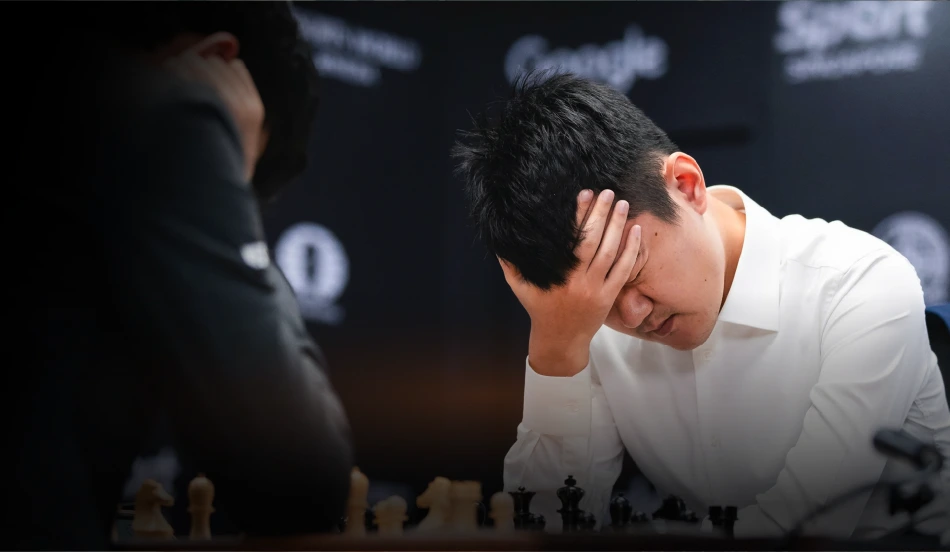Why Being Amateur Might Be Better Than Being Grandmaster
Discover the hidden advantages of being an amateur chess player compared to professionals, and learn how to enjoy the game without the stress of a competitive career.
Discover the hidden advantages of being an amateur chess player compared to professionals, and learn how to enjoy the game without the stress of a competitive career.

Hey there, I’m GM Gabuzyan, a retired chess Grandmaster, and in this article, I’m going to share with you a surprising truth: amateur chess players have some serious advantages over professionals.
Don’t believe me?
Then let’s dive in and explore!
Imagine this: You’re in the most important chess game of your life. The score is tied at 6.5-6.5. Everything comes down to this one game. You’re sitting across from your opponent, the pressure is suffocating, and the whole world is watching.
That’s the situation in the game below — the final match of the World Championship. A super equal position. Even though Black is up a pawn, it’s a dead draw — just take a look at the engine’s evaluation.
Ding Liren (White) and Gukesh Dommaraju (Black).
It’s White to move.

No way to lose, right? Wrong!
Ding played 55.Rf2

And after the Rooks trade, he blundered 56...Bd5

After the Bishop trade, the resulting pawn endgame is completely lost!
Unexpected blunder in the last game of a match! No chance to come back - it’s over! Ding lost the crown of World Champion…

Ding Liren, 2024 Fide World Championship - moment of blunder (source: indianexpress.com)
This is the ultimate nightmare for any professional chess player. Honestly, I’d rather break my arm than go through something like this again. (In fact, one of the reasons I quit professional chess was to escape these super-stressful days.)
This is exactly what happened to Ding Liren, the reigning World Chess Champion, in his latest World Championship match. In that final game, he blundered in a super-drawish position and lost the title. Just like that. The emotions? Heartbreaking. Crushing. With all the respect Ding took it like a real man! But anyways…
The kind of pain only a chess professional would understand. The feeling of emptiness inside… like a hollow echo.
The world? Just black and white squares, no colors, no joy — just the haunting rhythm of the pieces that led to this moment.
But here’s the thing: you’re not Ding Liren.
Let’s flip this story.
As an amateur chess player, you’ll never face the kind of pressure Ding Liren just went through. Think about it: You don’t have millions of fans expecting you to win. No cameras zooming in as you wipe sweat from your forehead. And definitely no life-changing titles on the line.
Instead, your "tournaments" might happen in your pajamas, on a comfy couch, with your dog snoring nearby. Your opponents? Maybe a random stranger online with the username “PawnSlayer123” or your best friend who only knows how to push pawns.
In contrast, professionals have lots of challenges to face.
Being a professional sounds glamorous — traveling the world, sponsorships, and trophies. But the reality? Stress. Endless pressure. They train for hours, analyze thousands of positions, and live with the fear of making that one mistake.
One blunder, like Ding’s, and it’s not just a game — it’s years of preparation, reputation, and even financial rewards gone in seconds. And the stress doesn’t just stop at the board. It follows them home, into their sleep, into the next tournament.
Amateurs? You blunder a Queen, shrug it off, and click “Rematch.” You lose a game, and guess what? Nobody cares. Not even you.
Here’s the secret weapon amateurs have over professionals: freedom.
1. Little Stress: Nobody’s watching your games. No headlines, no interviews. Just you, the board, and a cup of tea.
2. Nothing to Lose: Miss a mate in one? It’s not the end of the world. It’s a learning moment, not a life-changing disaster.
3. Pure Joy: You’re playing for fun, for the love of the game. Professionals rarely get to do that. For them, every game is work.
There is only one thing I want to warn you about.
If you’re an amateur striving to improve at chess, hard work is still essential.
Even without the stress and pressure that professionals face, dedicating time to chess means committing to disciplined and high-quality training.
Your emotional benefits — no stress, no pressure — are priceless, but progress only comes with genuine effort!
So, champs, here’s my point: don’t stress about your rating. Don’t compare yourself to the GMs. Enjoy what you have — whether you’re rated 1200, 800, or even just learning the rules.
Play with the reckless joy of someone who has nothing to lose. Because while professionals might have the trophies, you have something they don’t: freedom.
Train with discipline and focus on quality, and you’ll experience positive emotions throughout your entire chess journey. 😁
On my own, I don’t want to downplay the benefits of being a professional. I dedicated my life to a chess career, and I don’t regret it. By the age of 29, I had already traveled to more than 40 countries, won numerous tournaments that gave me some of the best memories of my life, and met so many fascinating and diverse people. But all of that came at a price — the price of enormous stress.
Embrace your amateur status.
Thanks for reading, GM Gabuzyan was here with you 🙂
Feel free to share your thoughts in the forum.
P. S.
If you’re not a ChessMood student yet, I have three gifts for you:
1. Opening Principles - The fundamentals and beyond in detail
You can watch all three courses for free, by creating a free account here. (Takes a few seconds)
Originally published Dec 20, 2024

